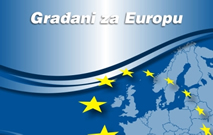European Commission adopts a Multi-annual Indicative Planning Document for Bosnia and Herzegovina for the years 2009-2011
 The European Commission adopted the strategic directions of EU financial assistance for Bosnia and Herzegovina. The Multi-annual Indicative Planning Document - MIPD for the years 2009-2011 defines that financial assistance to Bosnia and Herzegovina aims to support the country in three main areas, namely political reform and building up of democratic institutions, economic reform, and ability to assume the obligations of membership. A special component of the programme will finance cross-border cooperation.
The European Commission adopted the strategic directions of EU financial assistance for Bosnia and Herzegovina. The Multi-annual Indicative Planning Document - MIPD for the years 2009-2011 defines that financial assistance to Bosnia and Herzegovina aims to support the country in three main areas, namely political reform and building up of democratic institutions, economic reform, and ability to assume the obligations of membership. A special component of the programme will finance cross-border cooperation.
Financial assistance as provided under the Instrument for Pre-accession Assistance (IPA) in the defined areas of interventions is in line with the priorities under the European Partnership, the assessment of the annual Progress Report, and the Stabilisation and Association Agreement (SAA) with the EU. Financial assistance aims at supporting Bosnia and Herzegovina in its Stabilisation and Association process and preparing the country for future EU Accession.
For the period 2009-2011, the overall indicative amount of the EU financial assistance to Bosnia and Herzegovina - in the form of grants from the Community budget - is 303.2 EUR million. The main share of the budget is allocated to support activities under IPA Component I for Transition Assistance and Institution Building (EUR 287.3 million). A smaller share will be allocated to IPA Component II for Cross-Border Cooperation activities (15.9 EUR million).
To ensure the maximum efficiency and effectiveness of the EU financial assistance the definition of the major areas of intervention and the type of actions to be financed has been closely coordinated with the International Financial Institutions and other bilateral international donors, active in Bosnia and Herzegovina.
In more detail, the first political sub-component will focus on public administration reform, including support for the customs and taxation administration, the reform of the judiciary and of the police. The emphasis will be on institution building. It will support domestic efforts on the constitutional reform process as well as the media and civil society in order to contribute to the democratic stabilisation and the social and economic development of the country. IPA will also put emphasis on the protection of the cultural heritage in the context of the "Ljubljana Process".
The second economic development sub-component will focus on support the establishment of regulatory capacity and the enhancement of the entrepreneurial know-how. It will support the development of the SME sector, the economic development of the regions and will improve trade policies. Education reform and developing a national strategy on research will promote the development of economy and society and active labour market measures will assist in combating unemployment. The health sector will be reformed to ease the burden of public finances and to deliver adequate health care to citizens.
The third sub-component will finance actions to assist Bosnia and Herzegovina to cope with the approximation to the European acquis in the internal market, sectoral policies, justice, freedom and security. Emphasis will be placed on the development and implementation of strategies and policies and a regulatory framework compatible with European standards. IPA will support the implementation and enforcement of the sectoral policies and the preparation for IPA components III, IV and V.
Through component II, IPA will support cross-border co-operation by supporting joint projects at the borders with Croatia, Montenegro and Serbia and with EU Member States and other Western Balkan Countries (Albania, Croatia, Montenegro and Serbia) through the IPA CBC Adriatic Programme and by supporting Bosnia and Herzegovina's participation in joint projects under the European Regional Development Fund's (ERDF) transnational programmes "South-East Europe" (SEE) and "Mediterranean" (MED).
In order to soften the impacts of the financial and economic crisis, IPA will provide support to the financial sector, development of SMEs, job creation, support the institution-building of regulators and supervisors in the financial sector, investments in infrastructure, strengthening the roles of economic and financial regulators and cooperation with International Financial Institutions.
Source: www.europa.ba


